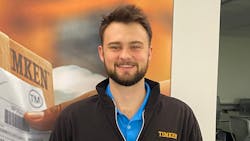Editor's note: On July 13, 2023, about two months after we ran this article, Jim Tomson announced that he had been promoted at Timken to operations supervisor. Congratulations to Jim for continuing his manufacturing leadership journey.
Name: Jim Tomson
Age: 24
Company: The Timken Co.
Education: Bachelor of Science (B.S.), Industrial Engineering
Position: Operations Development Program
Less than two years out of college, Jim Tomson is already on his third manufacturing job and will start his fourth soon. And, before you start complaining about the job-hopping tendencies of Gen Z, know that he’s doing this under the direction of a century-old company that knows a thing or two about developing talent.
While still in school, Tomson completed two co-ops with Timken: The first was in process development at the headquarters in Canton, Ohio, and the second was in operations engineering at a South Carolina plant.
“This just got my foot in the door, gave me exposure to the company and just gave me my first glimpse of a lot of the tools that are used in the plants,” he says.
After graduating from Schreyer Honors College at Penn State, Tomson was offered a full-time role in Timken’s Operations Development Program (ODP), “a two-year-long program where you rotate through four different roles of quality engineering, continuous improvement engineering, and that’s at one facility,” he says. “Then I moved to another facility for another year, and I will do another two roles of supply chain (where he is now) and then supervision being the last one.”
Generation Now stories focus on challenges and opportunities facing industry as multiple generations of leaders take on responsible roles in manufacturing. The first piece ran in the spring of 2022 and won a national award for manufacturing business writing.
Stories include:
- Generation Now Leadership: Part 1, Falling Into Manufacturing at Smucker's
- Generation Now Leadership: Part 2, Fast-Track Training at Timken
- Generation Now Leadership: Part 3, Career Advancement by Design at Northrop Grumman
- Generation Now Leadership: Part 4, Co-op to Advanced Manufacturing Management in a Decade at Freudenberg-NOK
- Generation Now Leadership: Part 5, Finding Passion at Precision Plus
- Generation Now Leadership: Part 6: From Military to Manufacturing at Graphic Packaging International
- Generation Now Leadership: Manufacturing’s Next Generation Steps Forward
- From Gen Z to C-Suite: an Intergenerational Conversation on Innovation
The ODP is a leadership development program designed to give participants a broad look at the different fields in manufacturing. It typically takes employees through two facilities, but Tomson will have the chance to work at three. “It’s experience that is just unmatched anywhere else,” he says.
Tomson grew up surrounded by his family’s scrap metal recycling business, and he always had an interest in math and science. He figured a degree in industrial engineering could be a good mix between business and engineering.
After graduation, Tomson decided to stay with Timken. “The amount of training and the amount of mentorship that I’ve just received from the company, I couldn’t see myself going anywhere else.”
Tomson is taking every chance he gets to learn, even if he doesn’t think it will directly apply to future jobs. “You’re only young once, and this is the opportunity to learn as much as you can, so then one day, you can execute on that knowledge that you develop,” he says.
Tomson describes his participation in this program as an investment.
“I’m just taking this opportunity to practice so many things: Develop my knowledge, practice my leadership skills and using them in conjunction to hopefully one day be a plant manager,” he says. “When I am asked later in my career to have more senior-level leadership, I'll have all these experiences, I’ll be able to call upon all these things to look at the bigger picture. Because if you just have experience in one avenue, you’re not going to be able to see the business as a whole.”
Although he has stayed under the Timken umbrella, Tomson sees the value in being flexible and trying out different positions.
“Early in your career, if you’re able to stay mobile, not be afraid to change jobs, I think it's really important to get a breadth of experience,” he says. “If you’re the person that’s saying, ‘Hey, I’m willing to move,’ not only do you have the ability to move within your plant, but then all the other plants as well.”
However, he says the main aspect of starting a successful career “comes down to your ability, aptitude and work ethic … I think that’s first and foremost.”
Tomson values communication. “Any of these projects, you’re not just doing this on your own, you have to be able to work with a wide group of people.”
His mentor Louise Dalton has helped Tomson advance this skill. She was assigned to him as part of the ODP.
“She’s always there to help me, point me in the [right] direction on maybe who to ask or what to do. She might not always have the answers to a lot of my questions … but she’s fantastic at knowing what questions to ask and who to ask them to.”
Many people have helped him develop strategy-level thinking.
“There’ve been mentors along the way, just naturally. I think every manager I’ve had also has turned into a mentor in some respect,” he says. “You spend most of your day here, so it’s only natural that these people start to want to take interest in your life and take interest in your growth.”
Tomson keeps an optimistic attitude when meeting and working with new colleagues.
In South Carolina, “I was the youngest person in the plant, except for maybe a few operators on the floor. But as far as engineers and salaried associates, I was definitely the youngest,” he says. “There’s a little bit of ‘Oh, this young college guy, this or that.’ And ‘Oh, he’s wearing his skinny jeans,’ … There’s usually some banter that comes with working in a manufacturing plant, and that’s part of the fun.”
Tomson emphasizes the importance of respect when working with more experienced employees. “They have years of experience running these machines and with these processes. So, it’s important to understand that they’re, first and foremost, the subject matter experts.”
Time seemed to break down any walls between Tomson and his older colleagues.
“I get a lot of pride talking with the people that I work with. A lot of these people that work in manufacturing, they have amazing stories. You have veterans, you have parents, you have people that are sacrificing a lot … It’s inspiring to be able to be working with these people.”
In summation, Tomson believes that trying out different fields and getting as much experience as you can is crucial to becoming a good leader. Not only does this provide self-discovery, but it allows the individual to have a more complete view of the business world.
“Knowing where you are and what you're interested in is really important, because I mean, happiness is ultimately what we want, right?” he says. “I think people lose sight of that.”
About the Author
Anna Smith
News Editor
News Editor
LinkedIn: https://www.linkedin.com/in/anna-m-smith/
Bio: Anna Smith joined IndustryWeek in 2021. She handles IW’s daily newsletters and breaking news of interest to the manufacturing industry. Anna was previously an editorial assistant at New Equipment Digest, Material Handling & Logistics and other publications.

